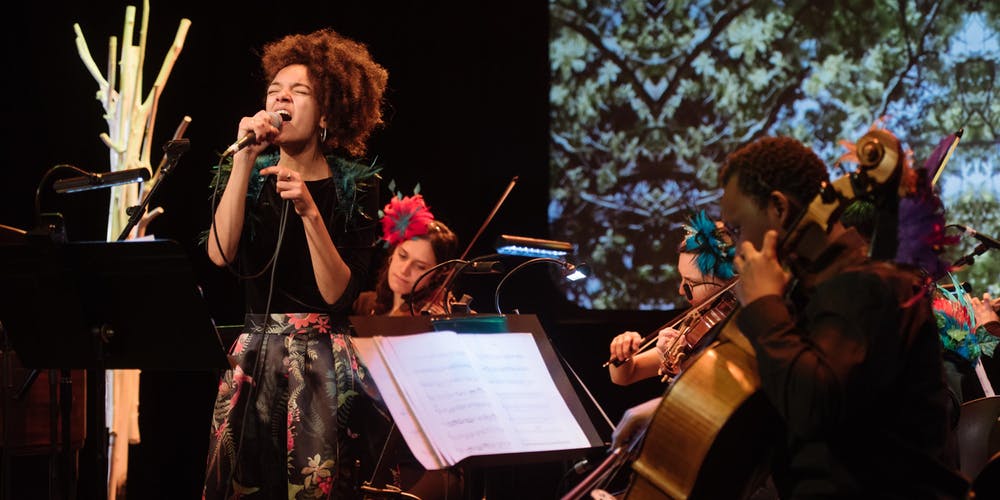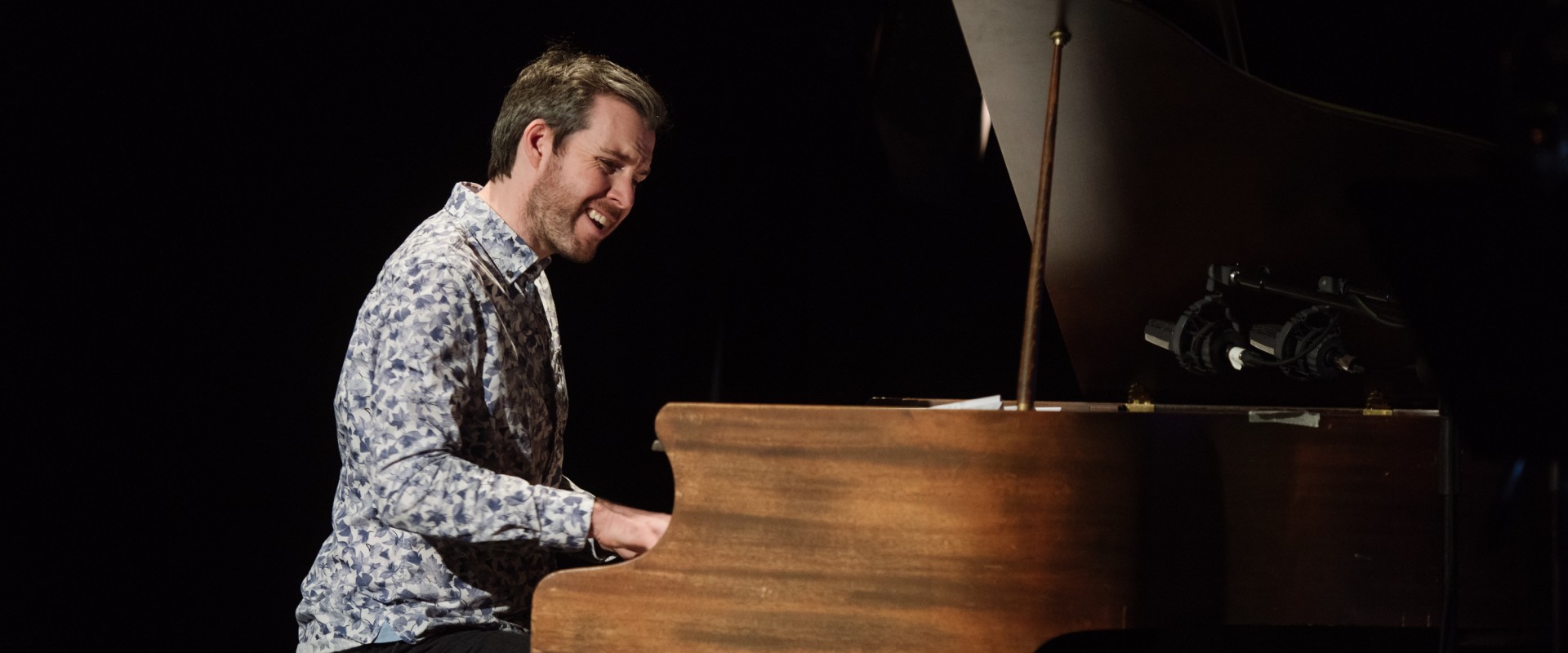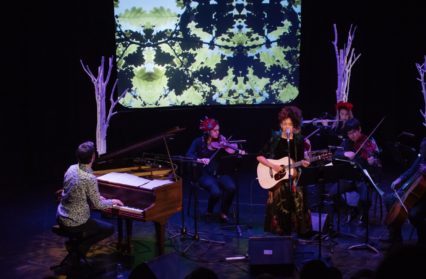Nigel Jarrett is at The Tramshed in Cardiff to review a performance of the bilingual song-cycle Birdsong / Cân Yr Adar by Sinfonia Cymru featuring Gwilym Simcock and Kizzy Crawford.
Gwilym Simcock belongs to the upbeat and clean-cut school of British jazz. Jason Rebello is another alumnus. They are both pianists and composers, albeit in an established modern style; unlike, say, Django Bates, who is upbeat and modern but sometimes lodged in a dissonant here-and-now bordering on the near future. Some would have had Bates down to write a musical score about the environment, a subject which tends to make most of us justifiably downcast and pessimistic, what with melting ice caps and all that. It would have been an opportunity to plumb disturbing, plastic-strewn depths, from which he could have risen optimistically.
But it’s Simcock and the singer Kizzy Crawford who have collaborated to write the bilingual song-cycle Birdsong / Cân Yr Adar with members of the ever-steadfast Sinfonia Cymru, and who see our surroundings in celebratory terms. Their inspiration is specific: the ancient woodland of Carngafallt in Powys. It’s a rainforest, but not as we normally recognise one. Living and breathing in that self-sufficient way rainforests do, it represents an ecosystem full of songbirds and other wildlife. The work’s free-improv opening sees, in live performance anyway, the musicians wandering on to the platform hooting, whooping and squawking in the ad libitum manner of a choir vernal before Simcock settles everything like some Green Man dispensing a string of deliciously plaintive chords. Then we’re off.

It’s a journey of the ‘I can feel the sunlight warming my body’ kind, an immersion in wonder rather than despoliation, however capable of restoring. But at least the sentiments are never less than genuine, something that comes through Simcock’s and Crawford’s invincible cheerfulness. Their achievement lies in not making that feeling sound pollyanna-ish or unrealistic. At the end listeners feel they have experienced something that in musical terms is heartfelt and neither too long nor too brief, and in emotional terms falls thankfully short of being cloying. Simcock alone is responsible for the introductory birdsong chorale and for the arrangements and orchestrations. In concert and on CD, for the promotion of which this was one of a few public concerts, there’s an audio ‘dawn chorus’.
Live, too, there’s gizmo enhancement of Crawford’s voice in some places. As an example of how to strike a balance between too much and too little in the deployment of the musical constituents, Simcock’s arrangements are exemplary; as a jazz pianist he might have been tempted when it was his turn and the others were comping or counting bar rests (not that there were many of them), to wander off to his and our advantage. It never happens, but he does invest his quota of time with what are no doubt on-the-spot excursions. It’s a disciplined score.

Crawford’s soaring, malleable, and full-on voice is just right for this sort of conception, and it’s the orchestra players – Simmy Singh and Lucy Mackay (violins); Fran Gilbert (viola); Helen Wilson (flute); Carys Evans (horn); and George Hoult (cello) – who have to adapt to a medium slightly different from the symphonic one they’re used to. They’re aided by Simcock’s orchestrations, which give them lots of space to play tutti and some to be featured as soloists, very effective ones too, which suggests that the pianist’s influence, coming from another musical ‘environment’, may have extended their interests and abilities; there’s nothing like the enthusiasm of a wave-surfing jazzer.
Of course, Sinfonia Cymru has long been hiving off smaller chamber groups to perform at the Riverside Theatre, Newport, in lunchtime concerts. All good experience and practice. (By the bye, cellist Hoult and flautist Wilson replace Abel Selaocoe and Sarah Bennett, respectively, who perform on the CD.) Simcock’s apportionments never ask for routine playing but in many instances for each musician to tease from their instruments enriching colours and sonic effects, none of them perfunctory.
Among Birdsong’s many virtues are its variety of tempi, the instrumental élan of its introductions, the energy of its choruses, the imaginative scoring of specific instruments and their sound worlds and, not least, the natural way Crawford’s lyrics slide effortlessly between Welsh and English. In Bywyd Gwyllt (Wildlife), the first part of the Spring sequence, she first takes up her guitar in a sort of helpless greeting of the season of renewal, though, as elsewhere, Simcock requires her to use it sparingly. There’s a languorous feel to the opening of the Summer section, Enaid angylaidd (Angelic Soul), with its ‘soaring through joyful celebrations’.
The start of Autumn, Mewn i’r Harddwch Tywyll Cyfriniol (Into The Dark Mystical Beauty) is marked by the use of the cello, its sound so often synonymous with mellow fruitfulness and nostalgia. These are compositional devices that denote intelligence and taste rather than any pandering to the obvious. At least, that’s how it sounds. And how it looks ‘live’: this performance was given against a backdrop of shimmering greenery, courtesy of Ruby Fox’s videos.
It would be so easy to scoff at such a rosily innocent view of nature – there’s no hint, for example. of redness, teeth, and claws, and we may be sceptical of the ability of birds and trees to reclaim concrete wastes – but one walks away from Birdsong infected by its unselfconscious belief that music can reflect what we’d like to see and what we should aim for without its being spelled out. It’s another creative step for Sinfonia Cymru and guest musicians, this time from different genres, who believe in productive alliances.
Nigel Jarrett is a winner of the Rhys Davies prize for short fiction and, in 2016, the inaugural Templar Shorts award. He’s a former daily-newspaperman and a regular contributor to the Wales Arts Review, Jazz Journal and Acumen poetry magazine, among others. He is also a poet and novelist. His latest story collection, Who Killed Emil Kreisler?, was published in 2016, as was his first novel, Slowly Burning. This year sees the publication of his short fiction pamphlet, A Gloucester Trilogy.
Sinfonia Cymru with Gwilym Simcock and Kizzy Crawford: Birdsong / Cân Yr Adar
Gwilym Simcock (piano)
Kizzy Crawford (vocals, guitar)
Simmy Singh (violin 1)
Lucy McKay (violin 2)
Fran Gilbert (viola)
Helen Wilson (flute)
Carys Evans (horn)
George Hoult (cello)
The Tramshed, Cardiff, 12 May 2018



 Enjoyed this article? Support our writers directly by buying them a coffee and clicking this link.
Enjoyed this article? Support our writers directly by buying them a coffee and clicking this link.







